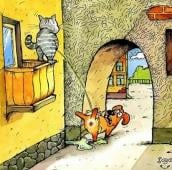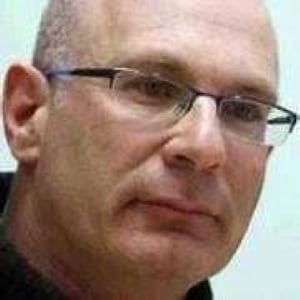/PAlogo_v2.gif) |
Italian storysingers: De Andre, Guccini & others |
Post Reply 
|
Page <123 |
| Author | ||
NotAProghead 
Special Collaborator 

Errors & Omissions Team Joined: October 22 2005 Location: Russia Status: Offline Points: 8040 |
 Post Options Post Options
 Thanks(0) Thanks(0)
 Quote Quote  Reply Reply
 Posted: August 04 2022 at 19:15 Posted: August 04 2022 at 19:15 |
|
Grazie, Lorenzo, I didn't know this story. Interestingly, later on Jannacci sung his song with De Andre's lyrics: |
||
|
Who are you and who am I to say we know the reason why... (D. Gilmour)
|
||
 |
||
jamesbaldwin 
Prog Reviewer 

Joined: September 25 2015 Location: Milano Status: Offline Points: 6052 |
 Post Options Post Options
 Thanks(0) Thanks(0)
 Quote Quote  Reply Reply
 Posted: November 07 2022 at 17:25 Posted: November 07 2022 at 17:25 |
|
Oh yes, Jannacci was a gentleman! He came from my hometown, Milano. |
||
|
Amos Goldberg (professor of Genocide Studies at the Hebrew University in Jerusalem): Yes, it's genocide. It's so difficult and painful to admit it, but we can no longer avoid this conclusion.
|
||
 |
||
jamesbaldwin 
Prog Reviewer 

Joined: September 25 2015 Location: Milano Status: Offline Points: 6052 |
 Post Options Post Options
 Thanks(0) Thanks(0)
 Quote Quote  Reply Reply
 Posted: November 07 2022 at 17:26 Posted: November 07 2022 at 17:26 |
|
|
Let's talk about the albums.
Here's to you my review of De Andre's Creuza de Ma: Maybe the first Italian record of "World music", Creuza de Ma is considered by many the masterpiece of Fabrizio De Andre, and artists like Peter Gabriel and David Byrne love it. In this Lp De Andre sings in Genoese dialect, a particular Italian language very different from Italian (I'm Italian and I dont understand a lot of words) with a sound similar to arab, and the arrangements (thanks to Mauro Pagani, ex PFM) are full of mediterraneum ethnic instruments taken also from middle-East.
"Creuza De Ma'" (Road to the Sea) is the first song, a melodic ballad where the artist describe his hometown, Genoa, a city full of small streets that rides along the coastline and Genoa is a city long and narrow, it is in front the sea and it has the mountains behind. De Andre talks about people, food, flavors. Very ethnic music. Rating 7,/8. Through the noises of the crowd, the first song is mixed with the second, which has a much more sustained and arabesque rhythm. Here you can see the great work of the multi-instrumentalist Mauro Pagani, who in addition to playing the strings performs in the solos with wind ethnic instruments throughout the album (flute, mandola, mandolin, violin, viola, oud, saz, bouzouki). It's a very special song, it's world music, and the lyrics tell of a prostitute with an Arabic name, "Jamin-A", able to drive men crazy, and alternates raw moments with poetic moments. Rating 8. Through sound effects, Pagani's solo that concludes the second song is mixed with words and war noises that introduce us to the masterpiece of the record, "Sidun", name of a city situated in Lebanon. This piece is introduced by an acoustic mandola or mandolin edits. De Andre sings a landscape of war where a father has lost a child and here the pathos rises to very high levels, condensed only in the voice and sound of the instrument played by Pagani, clear, clean and spooky. Then near to the end it starts an ethnic nenia with oriental percussion that looks like a heartbroken but not sad funeral song. We're at very high levels. Rating 9. Side A is like a suite because it contains three songs in connection. Rating side A: 8,5/9 Side B starts with an historic character, "Sinan Capudan Pascia'" is a character taken from the history of Genoa. Sinan was captured by Turks and later converted to Isalm. In this songs there is more storytelling, here De Andre recalls his favourite troubadors: Georges Brassens. The music is more accompaniment but has a nice rhythm. Rating 8. "A Pittima" talks about debts. It is the album's slow song, a reflective, introverted song, which contains noises reminiscent of the waves of the sea. Fine arrangement in the background, almost whispered and short song (three minutes). Vote 7.5/8. Soon after, to get the album back on its pace, the Lp's most cheerful and exuberant song starts ("A Dumenega" (The Sunday)), with a strong rhythm, and it reminds more of Italian folk and the lyrics speak again of neighborhoods from slums, with prostitution. But the instrumental ending is great and thanks to Franco Mussida who plays classical guitar and electric mandolin, we can listen to a very good Spanish guitar solo. Rating 8+. The closer is "Da A Me Riva" (From my seaside), another slow song, good but minor piece. Rating 7+. The second side, with songs shorter but homogeneous as in the first, it lacks of an absolute masterpiece. Side B. Rating: 8,5. The album is appreciated more than for the individual tracks for the construction of the ensemble, really remarkable for ideation, songwriters, melodies and arrangements. A great pleasure. A little masterpiece. Rating 8,5/9. Four and a half stars. |
||
|
Amos Goldberg (professor of Genocide Studies at the Hebrew University in Jerusalem): Yes, it's genocide. It's so difficult and painful to admit it, but we can no longer avoid this conclusion.
|
||
 |
||
jamesbaldwin 
Prog Reviewer 

Joined: September 25 2015 Location: Milano Status: Offline Points: 6052 |
 Post Options Post Options
 Thanks(0) Thanks(0)
 Quote Quote  Reply Reply
 Posted: November 15 2022 at 18:06 Posted: November 15 2022 at 18:06 |
|
|
Bruno Lauzi,
right-wing singer (liberal, not fascist) friend of Gino Paoli and the Genoese school, he also knew De André, in this song he takes a stand against left-wing songwriters, but saves Guccini. IO CANTERò POLOITICO I will sing political I will sing political when you shut up And all your slogans are defeated When you are tired of standing in the choir Clapping your hands only if they want you to And you need individualism To overcome the boredom of an absurd conformism I, I will sing political but the day is still far away For now I'm the only one going against the grain But my fake colleagues who make revolutions Sitting on parcels of genuine millions Will have to revert to the role of chicks Leaving the candid and poetic Guccini intact I, I will sing political but I will be too old And to the youth of the age I, I will break a lot The taste for dissent they will have lost by now And the festival down in the square will leave the country mute Peace in silence yes, that's democracy But the first one who denies it, you kick him out I will only sing politics for the people Who are ready to acknowledge that they don't understand anything It is not by changing tactics or the master's name That the people have finished being taken for suckers You want to be comfortable, no one to disturb you Eh well, you're served, you can masturbate. Edited by jamesbaldwin - November 15 2022 at 18:07 |
||
|
Amos Goldberg (professor of Genocide Studies at the Hebrew University in Jerusalem): Yes, it's genocide. It's so difficult and painful to admit it, but we can no longer avoid this conclusion.
|
||
 |
||
Cronopio 
Forum Newbie 

Joined: December 09 2021 Location: Voronezh Status: Offline Points: 3 |
 Post Options Post Options
 Thanks(0) Thanks(0)
 Quote Quote  Reply Reply
 Posted: October 31 2023 at 08:13 Posted: October 31 2023 at 08:13 |
|
I'll allow myself a small remark. I think this song (this sort of romance) would have been enthusiastically received in our Soviet pioneer camps!
|
||
 |
||
Post Reply 
|
Page <123 |
| Forum Jump | Forum Permissions  You cannot post new topics in this forum You cannot reply to topics in this forum You cannot delete your posts in this forum You cannot edit your posts in this forum You cannot create polls in this forum You cannot vote in polls in this forum |